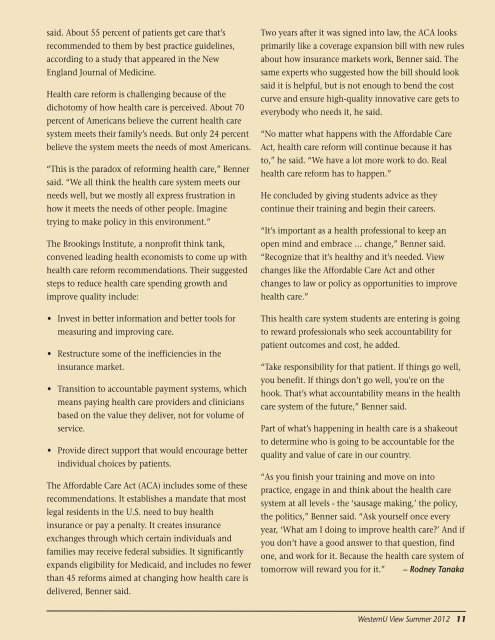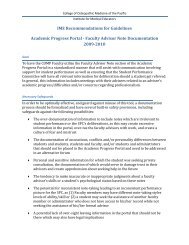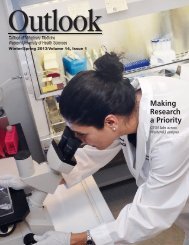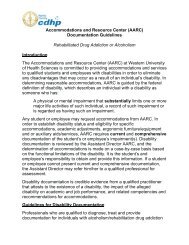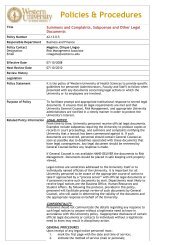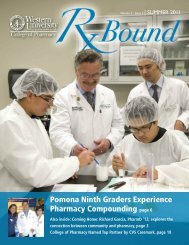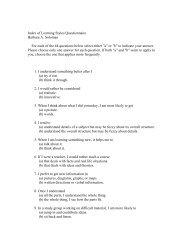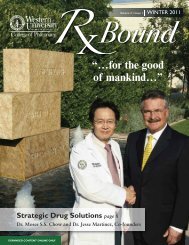PURSUiNG MEdicAl cAREERS AFtER SERviNG thEiR cOUNtRy
PURSUiNG MEdicAl cAREERS AFtER SERviNG thEiR cOUNtRy
PURSUiNG MEdicAl cAREERS AFtER SERviNG thEiR cOUNtRy
- No tags were found...
You also want an ePaper? Increase the reach of your titles
YUMPU automatically turns print PDFs into web optimized ePapers that Google loves.
said. About 55 percent of patients get care that’srecommended to them by best practice guidelines,according to a study that appeared in the NewEngland Journal of Medicine.Health care reform is challenging because of thedichotomy of how health care is perceived. About 70percent of Americans believe the current health caresystem meets their family’s needs. But only 24 percentbelieve the system meets the needs of most Americans.“This is the paradox of reforming health care,” Bennersaid. “We all think the health care system meets ourneeds well, but we mostly all express frustration inhow it meets the needs of other people. Imaginetrying to make policy in this environment.”The Brookings Institute, a nonprofit think tank,convened leading health economists to come up withhealth care reform recommendations. Their suggestedsteps to reduce health care spending growth andimprove quality include:• Invest in better information and better tools formeasuring and improving care.• Restructure some of the inefficiencies in theinsurance market.• Transition to accountable payment systems, whichmeans paying health care providers and cliniciansbased on the value they deliver, not for volume ofservice.• Provide direct support that would encourage betterindividual choices by patients.The Affordable Care Act (ACA) includes some of theserecommendations. It establishes a mandate that mostlegal residents in the U.S. need to buy healthinsurance or pay a penalty. It creates insuranceexchanges through which certain individuals andfamilies may receive federal subsidies. It significantlyexpands eligibility for Medicaid, and includes no fewerthan 45 reforms aimed at changing how health care isdelivered, Benner said.Two years after it was signed into law, the ACA looksprimarily like a coverage expansion bill with new rulesabout how insurance markets work, Benner said. Thesame experts who suggested how the bill should looksaid it is helpful, but is not enough to bend the costcurve and ensure high-quality innovative care gets toeverybody who needs it, he said.“No matter what happens with the Affordable CareAct, health care reform will continue because it hasto,” he said. “We have a lot more work to do. Realhealth care reform has to happen.”He concluded by giving students advice as theycontinue their training and begin their careers.“It’s important as a health professional to keep anopen mind and embrace … change,” Benner said.“Recognize that it’s healthy and it’s needed. Viewchanges like the Affordable Care Act and otherchanges to law or policy as opportunities to improvehealth care.”This health care system students are entering is goingto reward professionals who seek accountability forpatient outcomes and cost, he added.“Take responsibility for that patient. If things go well,you benefit. If things don’t go well, you're on thehook. That’s what accountability means in the healthcare system of the future,” Benner said.Part of what’s happening in health care is a shakeoutto determine who is going to be accountable for thequality and value of care in our country.“As you finish your training and move on intopractice, engage in and think about the health caresystem at all levels - the ‘sausage making,’ the policy,the politics,” Benner said. “Ask yourself once everyyear, ‘What am I doing to improve health care?’ And ifyou don’t have a good answer to that question, findone, and work for it. Because the health care system oftomorrow will reward you for it.” – Rodney TanakaWesternU View Summer 2012 11


